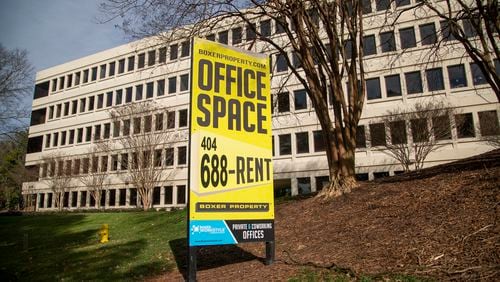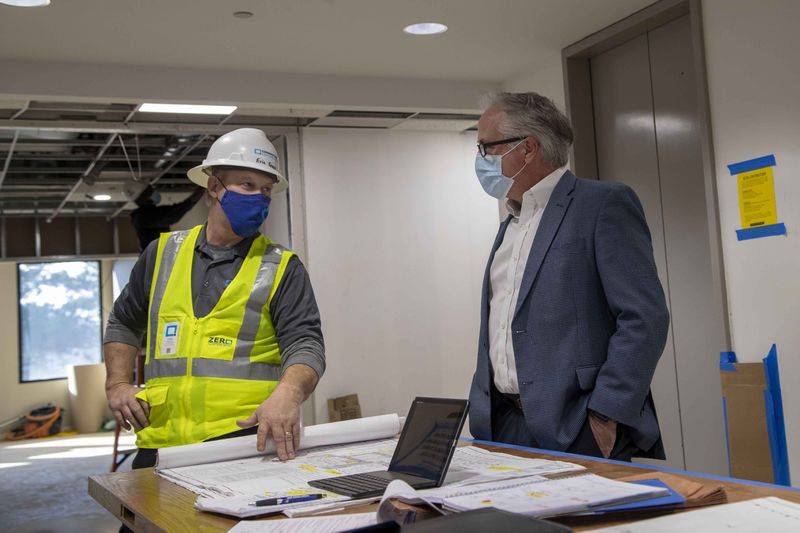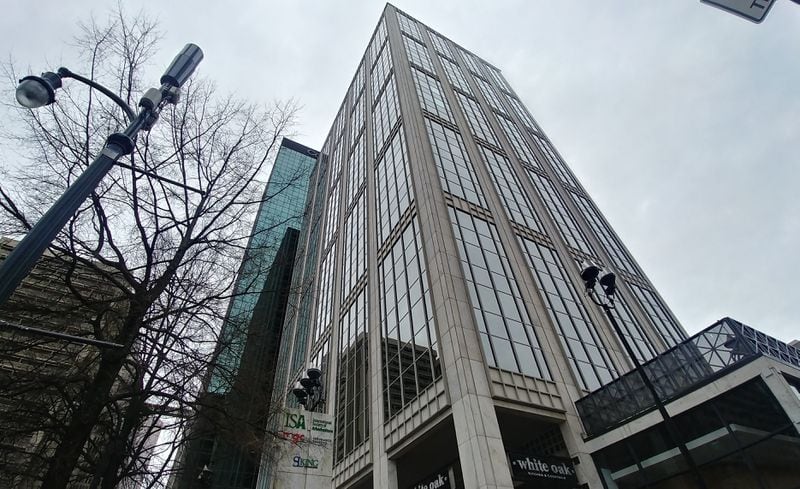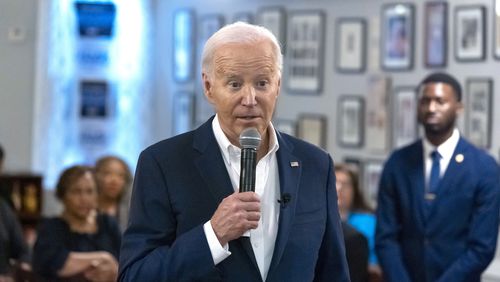Richard Bowers owns and manages two downtown office towers on Peachtree Street. They have immaculately designed lobbies, panoramic views and share access to an upgraded conference center and a 20-station exercise facility.
The two buildings, which sit next to each other and count the Georgia Chamber of Commerce and the engineering firm S.L. King & Associates among their tenants, are 90% leased. Because of the pandemic, though, they’re only 10% occupied.
Bowers has given some tenants a temporary discount on rent payments to help them survive the pandemic and coax them into returning when it’s over. But some have stopped paying entirely.
Bowers said he can’t afford to operate like this much longer.
“It’s a horrible situation,” Bowers said. “This is probably the worst world that we’ve ever experienced.”
A financial reckoning may be looming for office landlords. Many buildings remain mostly empty, and there’s no guarantee all the businesses will return when it’s deemed safe. In some cases, building owners, like Bowers, have been forced to offer deep discounts to struggling office tenants. That, in turn, has put their own finances in jeopardy.
At the same time, many landlords don’t know what their best next move is. Though they are eager for tenants to return as soon as possible, that could mean spending big to upgrade their facilities for COVID safety before they know which course the pandemic will take.
“Are you really going to put all this capital into the property when the improvements could become almost irrelevant?” said David Kahn, a managing analyst at real estate data provider CoStar Group.
And there’s an added complication: Some experts are predicting that the pandemic will fundamentally change how and where Americans work.
Already, signs of trouble have appeared.
The average office rent for metro Atlanta office space fell from $26.61 per square foot in March 2020 to $26.45 in December, according to CoStar Group. That might not seem like much, but it’s the first time the price has gone down since 2012. And it doesn’t reflect temporary discounts, like the ones that Bowers is offering, or rent-free months given during the pandemic.
The number of paying tenants has dropped. The average vacancy rate in metro Atlanta, which had remained flat for five years, increased from 11.5% in January 2020 to 13% in December, according to CoStar. But many real estate experts expect that number to jump significantly this year, as leases come up for renewal. Victor Calanog, head of commercial real estate economics at Moody’s Analytics, estimates the national vacancy rate could rise to 19.4% by December.
In a Jan. 15 research report, Calanog predicted, “2021 will be a tough year for the office sector.”
Turbulence in the office market has popped up nationwide. New York, San Francisco and Las Vegas have all tanked since the pandemic began, according to media reports.
Credit: Alyssa Pointer / Alyssa.Pointer@
Credit: Alyssa Pointer / Alyssa.Pointer@
In Georgia, state courts have been closed or conducting limited business during the pandemic. That’s postponed thousands of commercial eviction cases.
Some commercial tenants have been able to avoid paying any rent with the eviction notices filed against them frozen due to the courts’ closure, said Eric Teusink, a Decatur real estate attorney.
“The backlog of cases is immense and growing,” said Teusink, who represents landlords and tenants.
Some tenants have been able to buy time with the federal Paycheck Protection Program, which provided forgivable loans to pay rent.
But courts will eventually reopen. PPP loan funds will run out. And landlords will no longer be able to provide rent concessions. If tenants still can’t pay full rent, that’s an untenable situation for building owners, said Jeff Pollock, managing principal at real estate firm Pollock Commercial.
“A lot of properties are in a difficult financial position right now,” Pollock said.
Few office building owners have filed for bankruptcy so far, said Atlanta bankruptcy attorney Rob Williamson. But that’s likely to change.
“We believe there will be a real pickup in real estate-driven cases over the last half of the year, after all of the stimulus money washes through the system,” Williamson said.
An uptick in loan defaults on office buildings is also likely to emerge later this year, Calanog said.
Credit: Andy Peters
Credit: Andy Peters
Increasingly, tenants are trying to rent out office space they’re not using while employees are working from home. About 5.5 million square feet of office space in metro Atlanta is currently available for sublease, compared to 3.2 million in January 2020, according to CoStar.
While a sublease is intended to help an office tenant make money on something they’re not using, it also suggests the tenant may move out for good.
“They’re willing to explore the possibility of a more permanent remote work setup,” Kahn said.
Surveys have shown that workers feel that they’re productive at home, and many don’t want to ever go back to an office.
Still, some landlords insist everything is fine, or will return to normal, once the pandemic subsides.
“The statement that the office is dead is ridiculous,” said Scott Meadows, president of Brand Real Estate Services in Duluth. “The office is here to stay.”
Michael Bull, CEO of Bull Realty, agrees. While some employees might like working from home, there are managers and supervisors who say production suffers when employees are at home, he said.
“Working from home has been disappointing,” Bull said.
Cousins Properties operates the 38-story Promenade tower and 15 other office buildings in metro Atlanta. The company’s tenants have said they want to return to the office when it’s safe, said CEO Colin Connolly.
“Working from home has proved serviceable,” Connolly said during an Oct. 31 conference call with investors. “Pandemics do end, however, and we believe this trend will likely prove to be temporary.”
Some landlords aren’t taking any chances. David Barry, regional leasing manager for Boxer Property, is spending about $500,000 to renovate a floor at 2310 Parklake Drive in Northlake Office Park. Contractors are breaking up 13,000 square feet of office space into 17 separate offices. There is disagreement on what type of floor plan is best to prevent spread of the virus, but Barry said his clients believe more walls are the way to go.
“No one wants an open floor plan anymore,” Barry said. “Everyone is wanting a private office.”
Barry has tried to meet tenants’ demands for the newest coronavirus safety technologies, too. Those include specialty air purification systems that can be moved around an office.
“Throughout the country we’re seeing these types of requests,” Barry said.
Bridge Commercial Real Estate has spent $4.5 million to redesign The Dupree, a 138,000 square-foot office building on Powers Ferry Road, in a way that facilitates social distancing. It also has added a new exterior patio so employees can access outdoor space, said CEO Jeff Shaw.
Many office landlords think those types of upgrades will become mandatory.
“Some companies may not return to the office full time,” Shaw said. However, he continued, “many companies will still want to provide the option for employees at least a few days a week.”
Workers will feel safe coming back to the office only if building management has reconfigured interior design and installed new equipment during the pandemic, Pollock said.
Some landlords can’t afford those kinds of expenses, though, especially if they are already struggling with reduced rent collections. Bowers believes his two office towers — 260 Peachtree and 270 Peachtree — already have adequate air-filtration systems and other safety equipment.
“I don’t know that doing another upgrading of air filtration will get them back to the office,” he said. “I want to see where we are with the vaccines first, then we’ll address those other issues down the road.”
In some ways, tenants have the upper hand over landlords. Building owners know that, if they lose a tenant that always paid on time before the pandemic, it will be difficult to replace them with an equally reliable tenant, said Andy Graiser, co-president of A&G Real Estate Partners in Melville, New York.
Tenants should drive a hard bargain with landlords because it could be another two years before the economy fully rebounds, Graiser said.
Bowers hopes it’s much sooner than that, maybe within the next six months as vaccine distribution improves.
He acknowledged that’s not a given. Meanwhile, with his office towers remaining largely empty, he’s losing patience. That’s because his lenders, he said, are losing patience with him.
“I own the buildings, and I pay the mortgage, too,” Bowers said. “Our lender isn’t real concessionary. Lenders like getting paid.”
Atlanta’s office market
U.S. office space under construction: 119 million square feet
Metro Atlanta office space under construction: 7 million square feet
Atlanta represents 6% of all office space under construction nationwide.
Source: CBRE December 2020 data
Fulltime metro Atlanta employees working from home
2019: 262,119
February 2021: 2.04 million, a 677% increase
Source: CommercialCafe/Yardi Systems Inc.
U.S. fulltime employees working from home
Pre-pandemic: 12%
January 2021: 42%
Source: Upwork
About the Author
Credit: AP









